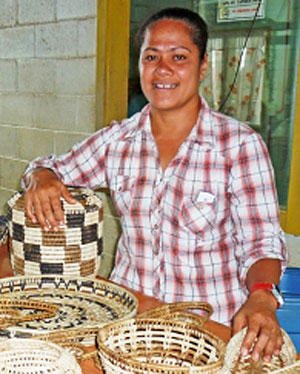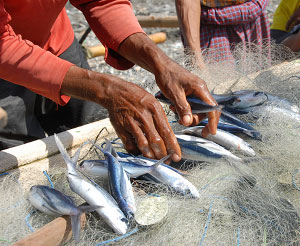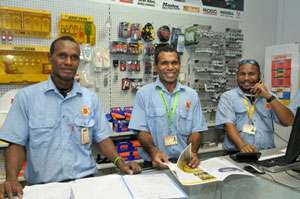Australia and the World Bank Group Partnership: Unlocking potential, achieving results
The Pacific Microfinance Initiative has helped women in Tonga start small businesses. Photo: Sara King, IFC
Australia and the World Bank Group recognise the crucial role the private sector plays in spurring growth and reducing poverty in developing countries. A strong and vibrant private sector creates vital jobs and services, providing people with the opportunity to improve their lives. Australia is working with the International Finance Corporation (IFC), the world's largest global development finance institution and a private sector arm of the World Bank Group, to promote private sector investment in emerging markets.
As a member of the World Bank Group, the IFC fosters sustainable economic growth by financing private sector investment, mobilising capital and advising businesses and governments on projects that provide lasting benefits to communities and the environment. Australia has allocated close to US$80 million in funding to IFC Advisory Services globally since 1995, with over a third directed to projects in the Pacific region. Expanding financial services, building better business environments, improving infrastructure and creating sustainable businesses is the focus of the partnership.
In 2012, Australia released a strategy that describes its approach to the development of the private sector in partner countries. The strategy seeks to improve the focus of country programs in this space, which may underpin strengthened partnerships with key multilateral organisations such as the IFC. Complementing such efforts, Australia will increase its engagement with the business community, both in partner countries and with Australian firms.
Building the base for business in the Pacific
Microfinance in East Timor helps villagers make a living from selling dried fish. Photo: Joao Vas, AusAID
The IFC, in partnership with Australia, is stepping up its support to East Timor's private sector to help create the jobs and services that are vital for the country's future. Under the Pacific Microfinance Initiative, the IFC and Australia are helping to transform and strengthen the country's leading microfinance organisation, Moris Rasik, into a commercial entity. This will help attract new investment to expand their activities across the country. With the IFC's help, Moris Rasik aims to grow its customer base by 45 per cent to 16,000 and increase deposit accounts by 5,000 over the next three years.
The IFC and Australia have also worked with the East Timor Government to introduce clearer and simpler procedures so that business registration is faster and easier, saving business owners' valuable time and money. It now takes on average 19 days to register a company, compared to the 83 days it took in 2011.
In 2011, the Pacific Microfinance Initiative also assisted a local PNG institution [external website], Bank South Pacific, to promote innovative e-banking products–including EFTPOS, and links between mobile phones, bank accounts and tablet computers–to extend banking services to people living in remote areas. As a result, close to 35,000 people in rural villages now have access to mobile banking in rural areas.
Linking people, creating jobs in Papua New Guinea and the Pacific
Support to telecommunications in Papua New Guinea and the Pacific is helping people and businesses connect. Photo: Richard Dellman, World Bank
When IFC-backed telecommunications company Digicel entered the Papua New Guinea market in 2006, it brought reliable and affordable mobile phone services to millions of people. It also created new jobs for some 30,000 people who sell Digicel airtime. To help these entrepreneurs, the IFC, with the support of the Australian Government, designed a business training program that has taught business planning, sales, and customer service skills to 133 Digicel distributors, helping them grow their businesses, create jobs, and earn higher incomes [external website].
This work with individual mobile phone providers is part of broader support that the World Bank Group and Australia have been providing to governments in the Pacific to help open up the telecommunications market and improve access. Some two million more people in Papua New Guinea and the Pacific now have mobile phones compared to a decade ago. This has reduced the cost of doing business and helped create new economic opportunities, as well as connecting households.



